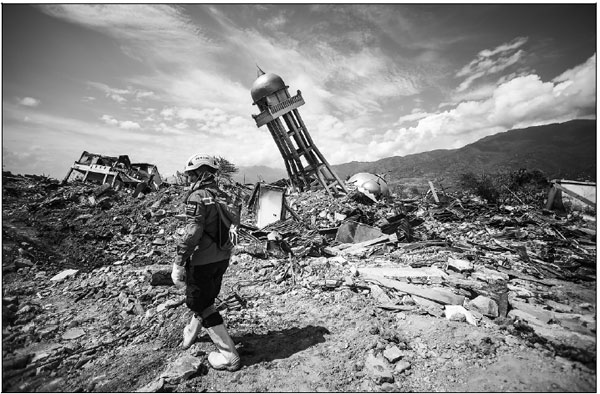Aid pours into Indonesian city stricken by disasters
Some have criticized country's lack of preparedness in deadly quake, tsunami
PALU, Indonesia - Aid poured into disaster-ravaged Palu on Sunday after days of delays as efforts ramped up to reach 200,000 people in desperate need following a deadly quake-tsunami in the Indonesian city.
Planeloads of food, clean water and other essentials were landing with increasing frequency at Palu on Sulawesi island, where a powerful earthquake and a wall of water leveled parts of the region and killed at least 1,763 people, officials said on Sunday.
Looters ransacked shops in the aftermath of the disaster more than a week ago, as food and water ran dry and convoys bringing lifesaving relief were slow to arrive.
But the trickle of international aid to Palu and local efforts to help the survivors have accelerated in recent days.
Daisy chains of troops unloaded supplies directly onto trucks for distribution to villages around Palu or helicopters for delivery further afield.
More than 82,000 military and civilian personnel, as well as volunteers, have descended on the devastated city while Indonesian army choppers are running missions to deliver supplies to remote parts of the region that were previously blocked off by the disaster.
"They are in great need because the road is cut off and it's accessible only by air", Second Lieutenant Reinaldo Apri said after piloting a chopper to rugged Lindu district, some 40 kilometers south of Palu.
Tons of donations from Australia and the United States reached Palu on Sunday morning aboard Hercules military aircraft. A plane chartered by Save the Children also landed with emergency shelter and water purification kits as did another carrying a medical team from South Africa.
Teams of Indonesian Red Cross workers set up warehouses and fanned out to distribute supplies across the region, where the double-punch disaster reduced entire neighborhoods to rubble.
But relief workers face a monumental task ahead.
Getting vital supplies to affected areas has proved hugely challenging, with only a limited number of flights able to land at Palu's small airport, forcing aid workers to take grueling overland journeys.
The tens of thousands left homeless by the disaster are scattered across Palu and beyond, many squatting outside their ruined homes or bunkered down in makeshift camps and entirely dependent on handouts to survive.
"There is nowhere else to get food, nowhere is open," said 18-year-old Sela Fauziah in Palu's central market, where she queued with hundreds for essential food items being distributed by soldiers.
As Indonesia struggles with the aftermath of the devastating quake, the spotlight has again been shone on the apparent lack of preparedness in a sprawling archipelago that suffers regular tremors, lying on the seismically active so-called Pacific Ring of Fire.
With the first waves in Palu arriving within around four minutes and power and communications knocked out by the quake, text message alerts or sirens would probably not have been enough, even if they were working.
Denis McClean, a spokesman of the UN Disaster Risk Reduction agency, told a briefing only public awareness would have saved people under these circumstances.
"It happened very quickly. There wasn't much time for warnings to be disseminated, so it was very much dependent on the level of public awareness in order to save lives."
Indonesia's national disaster mitigation agency spokesman Sutopo Purwo Nugroho said people still often did not know what to do when a disaster strikes.
Unlike in quake-prone countries like Japan and New Zealand, earthquake education and drills are conducted only sporadically in Indonesia.
"The problem in tsunami early-warning systems is not the structure, not its tools, but the culture in our communities," Nugroho told reporters.
AFP - Reuters
|
An Indonesian search and rescue member walks near a collapsed mosque at Perumnas Balaroa village in Palu in Central Sulawesi on Saturday, following the September 28 earthquake and tsunami. Mohd Rasfan / Agence Francepresse |
(China Daily 10/08/2018 page11)















